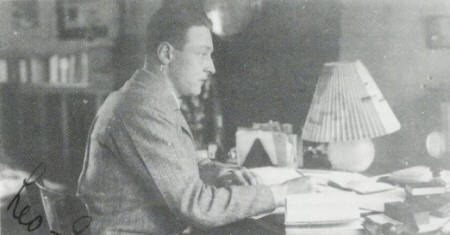

Partner Jos Krop
Queer Places:
Cimitero Monumentale di Taormina
Taormina, Città Metropolitana di Messina, Sicilia, Italy
 Leendert Maria
"Leo" van Breen (June 16, 1906 - August 11, 1988) was born on May 16, 1906 in Goes, the son of the English teacher of the Goese HBS Maarten van Breen and Cornelia Elizabeth Mulock Houwer, from Zierikzee. After the HBS, Van Breen soon had to serve in the military. He then opted for journalism and became a volontair at the Middelburgsche Courant.
At the age of nineteen he left for The Hague to work as a volontair at the newspaper Het Vaderland, but six months later (July 1926) he re-registered at the parental address in Goes. His homosexuality is the reason he
was expelled from the Hague daily newspaper.
Early on he wrote poems, partly under the influence of his first homosexual experiences and the associated loneliness and doubts.
His first collection, What Wash the Sea, was published in 1928. He was then a journalist at Ons Zeeland and
wrote columns in dialect under the alias Pier van 't Hof. In addition, he was one of the four founders, and secretary, of the Zeeland Association for Dialect Research. He provided a Zeeland Volksalmanak, and
was active in many areas, including brochures, plays and hearing plays for the peace movement. Van Breen
was a convinced peace activist during this period. He drew his pacifist inspiration from the Christian faith. Much of the poetry from this period
was published in Christian Opwaartsche wegen.
Leendert Maria
"Leo" van Breen (June 16, 1906 - August 11, 1988) was born on May 16, 1906 in Goes, the son of the English teacher of the Goese HBS Maarten van Breen and Cornelia Elizabeth Mulock Houwer, from Zierikzee. After the HBS, Van Breen soon had to serve in the military. He then opted for journalism and became a volontair at the Middelburgsche Courant.
At the age of nineteen he left for The Hague to work as a volontair at the newspaper Het Vaderland, but six months later (July 1926) he re-registered at the parental address in Goes. His homosexuality is the reason he
was expelled from the Hague daily newspaper.
Early on he wrote poems, partly under the influence of his first homosexual experiences and the associated loneliness and doubts.
His first collection, What Wash the Sea, was published in 1928. He was then a journalist at Ons Zeeland and
wrote columns in dialect under the alias Pier van 't Hof. In addition, he was one of the four founders, and secretary, of the Zeeland Association for Dialect Research. He provided a Zeeland Volksalmanak, and
was active in many areas, including brochures, plays and hearing plays for the peace movement. Van Breen
was a convinced peace activist during this period. He drew his pacifist inspiration from the Christian faith. Much of the poetry from this period
was published in Christian Opwaartsche wegen.
In 1932 he moved to Renesse (he inherited land there), where he and his life partner Jos Krop tried to build a life as a project developer, book and art dealer. Van Breen and Krop started their own newspaper the Eerste Badcourant voor Schouwen. At the same time, Leo van Breen wrote poetry that he published in important literary journals and which appeared at renowned publishers in beautiful collections, such as the satirical A Journey by Armchair.
In 1935 he left for The Hague with Jos Krop. They started a news agency for aviation, and an advertising agency. In the spring of 1940 Van Breen's novel Farewell Budapest was published. In this lighthearted, sometimes cynical story, the threat of war is undeniably at play, with Hitler and the Nazis not getting off well. The circulation of this novel was confiscated by the Germans in May 1940. When the war broke out, Van Breen joined the resistance. After the war Krop and Van Breen started an art dealership called 'Epoque' in Delft, where Hans Warren, for example, sometimes bought something. However, they mainly invested their capital in all kinds of weekly newspapers. For a short time they owned the Haagse Post. The most remarkable thing about this was the organ of the ex-political prisoners, the weekly of the former resistance De Prinsestad. Next, Van Breen iwass the editorial soul of Burgerrecht, the weekly magazine of the Netherlands on the right, which Krop marketed as a publisher.
Leo van Breen regularly brought his combativeness into conflict. Not only with society, but also with the literary directions in the Netherlands. Several of his verses were refused by editors; not because they would not be literaryly responsible, but because the poet took a sharp and personal stand against certain expressions and events.
In 1962, reviled by the literary world and marginalized by journalism in the Netherlands, Krop and Van Breen left for Italy. On 11 August 1988 Leo van Breen died in Taormina in Sicily and was buried there. In recent years he had written, probably relatively lonely and very forgotten, sombre poems, such as Val.
My published books: